
Gerald Maxwell Rivera, known mononymously as Maxwell, is an American singer, songwriter, and record producer. He rose to prominence following the release of his debut studio album Maxwell's Urban Hang Suite (1996), which received widespread acclaim and spawned the hit singles "Ascension " and "Sumthin' Sumthin'". Through the album and its follow ups, Maxwell has been cited—along with Lauryn Hill, D'Angelo, and Erykah Badu—for ushering in the neo soul movement and its sensibilities into mainstream popular music during the late 1990s.
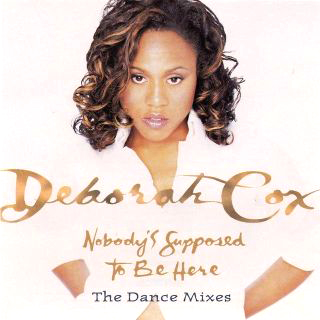
"Nobody's Supposed to Be Here" is a song by Canadian recording artist Deborah Cox, released as the lead single from her second studio album, One Wish (1998). Written by Montell Jordan and its producer, Anthony "Shep" Crawford, the song was released on the same day as the album, on September 15, 1998, by Arista Records. It is Cox's most successful song, peaking at number two on the Billboard Hot 100 for eight weeks and spending a then-record 14 weeks at number one on the Hot R&B Singles & Tracks chart. In 2017, Billboard ranked the song at number five on its "Greatest of All Time Hot R&B/Hip-Hop Songs" chart.

Embrya is the second studio album by American recording artist Maxwell, released on June 30, 1998, by Columbia Records. As on his 1996 debut album Maxwell's Urban Hang Suite, he collaborated with record producer and Sade member Stuart Matthewman. A neo soul album, Embrya features heavy basslines, string arrangements, and an emphasis on groove over melodies. It has themes of love and spirituality.

"A Song for Mama" is a number-one R&B single by the American R&B group Boyz II Men. The tune, which was written and produced by Babyface, served as the theme song to the 1997 motion picture Soul Food, and spent two weeks at number one on the US R&B chart. To date, it is their 11th and last top 10 hit, peaking at number seven on the Billboard Hot 100. The song also appears on the group's fourth album, Evolution (1997).

"On & On" is a song by American singer-songwriter Erykah Badu, released on December 10, 1996, by Kedar Records and Universal Records as the lead single from Badu's debut studio album, Baduizm (1997). It was written by her with JaBorn Jamal. A neo soul song, it features teachings of the Five-Percent Nation in its lyrics. A commercial success, it spent two weeks atop the US Billboard Hot R&B Singles chart, while peaking at number 12 on both the Billboard Hot 100 and the UK Singles Chart. Critically acclaimed, the song won Best Female R&B Vocal Performance at the 40th Annual Grammy Awards (1998). Its accompanying music video was nominated in the categories for Best Female Video and Best R&B Video at the 1997 MTV Video Music Awards. Pitchfork included "On & On" in their list of "The 250 Best Songs of the 1990s" in 2022.
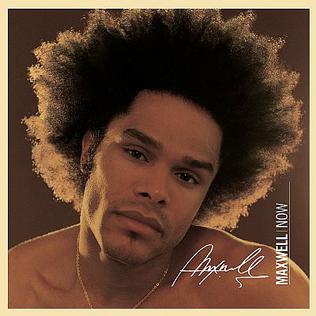
Now is the third studio album by American R&B singer Maxwell. It was released on August 14, 2001, by Columbia Records. Following the lukewarm critical reception of his 1998 record Embrya, Maxwell pursued a different direction while recording Now, abandoning the conceptual style of his previous albums.

"I Can Make It Better" is a song by American recording artist Luther Vandross. It was released in 1996 as the second single from his tenth and platinum album, Your Secret Love (1996). The song reached number 15 on the US Billboard Hot R&B Singles chart and peaked in the top fifty on the UK Singles Chart. A music video was also produced to promote the single.

"Sweet Thing" is a song performed by American funk and R&B band Rufus with vocals by band member Chaka Khan. As a single, it peaked number five on the US Billboard Hot 100 in 1976. Mary J. Blige recorded her version, which charted in the United States and New Zealand in 1993.

"Seven Days" is a song by American singer Mary J. Blige. It was written and produced by Malik Pendleton for her third studio album Share My World (1997). The song is supported with a guitar solo from American guitarist George Benson. Lyrically, "Seven Days" talks about a woman going through a dilemma in a relationship with a man who had been her best friend before a truth or dare? game led to them experiencing a relationship that has left Blige and the man in question at a crossroads of how to address each other.
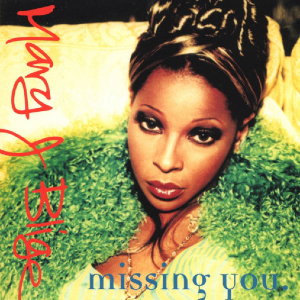
"Missing You" is a song by American singer Mary J. Blige. It was written and produced by Babyface for her third studio album, Share My World (1997). In the United Kingdom, the song was released as the album's third single where it reached number 19 on the UK Singles Chart. "Missing You" features background vocals from singer Shanice and talks about a woman in a dilemma over a relationship with a man that she at first claimed she "wasn't in love" with but then finds herself "thinking about him all the time" and her missing him.

BLACKsummers'night is the fourth studio album by American recording artist Maxwell, released July 7, 2009 on Columbia Records. It is the follow-up to his third album Now (2001). Recording sessions for the album took place during 2003 to 2009 and production was handled entirely by Maxwell and Hod David.

"When You Talk About Love" is a song recorded by American singer and actress Patti LaBelle. It was written by Ann Nesby, James Harris III, Terry Lewis, and James "Big Jim" Wright for her thirteenth studio album, Flame (1997). Production was helmed by Harris and Lewis, with Wright credited as co-producer. Released as the album's lead single, it became one of the LaBelle's most popular hit singles in the 1990s, reaching number 56 on the US Billboard Hot 100 and number 12 on the Billboard Hot R&B/Hip-Hop Songs chart. A dance remix of the song helped to bring the song to number-one on the Billboard Hot Dance Club Songs chart, making it the fourth number-one dance single in LaBelle's career. The accompanying music video featured LaBelle playing a teacher giving a "class" about love.

"A Rose Is Still a Rose" is a song recorded by American singer Aretha Franklin. It was written and produced by singer Lauryn Hill for Franklin's album of the same name (1998). The song focused on a motherly figure giving advice to a younger woman who keeps getting into bad relationships. Throughout "A Rose Is Still a Rose", Franklin advises that in spite of everything and despite the woman's "scorned roses and thorn crowns," the woman is "still a rose". Elements of the song "What I Am" by Edie Brickell and the New Bohemians were sung throughout the song by Hill herself.

"Lady" is a song co-written, co-produced and performed by American neo soul singer D'Angelo, issued as the third single from his debut studio album, Brown Sugar (1995). A remixed version of the song was also released, featuring vocals from American hip hop musician AZ. Separate music videos were created for both versions of the song.

"Soon as I Get Home" is a song by the American singer Faith Evans. It was written by Evans along with Sean Combs and Chucky Thompson for her debut studio album Faith (1995), while production was helmed by Combs and Thompson. A romantic hip hop soul ballad which chronicles a woman's desire to spend more time with her loved one, it was inspired by Evans' marriage to her then-husband The Notorious B.I.G., which had changed radically after the major commercial success of his debut album Ready to Die (1994).

"Ascension (Don't Ever Wonder) is a song by American R&B/neo soul singer Maxwell, released in July 1996 by Columbia as the second single from his debut album, Maxwell's Urban Hang Suite (1996). The song was written by Maxwell, G Syier Hawkins Brown and Itaal Shur, and he also produced it. It peaked at number eight on the US Billboard R&B/Hip-Hop Songs chart, number 36 on the Billboard Hot 100 and number 28 on the UK Singles Chart. The music video was directed by Liz Friedlander. The B side of the single is "Lock You Up N' Love Fa Days", which was previously unreleased and also written and produced by Musze.
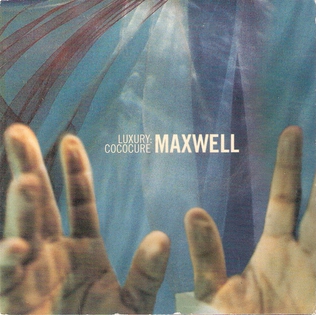
"Luxury: Cococure" is a song by American R&B singer Maxwell, released as the first single from his second album, Embrya (1998). The song received heavy radio play on mainstream pop and r&b radio markets, but failed to reach either Billboard Hot 100 or R&B songs chart. The single peaked to no. 16 on Hot R&B/Hip-Hop Airplay in 1998.

"Come Over" is a song by American recording artist Faith Evans. It was written by Evans, Floyd Howard, Sean Combs, and Chucky Thompson for her debut studio album Faith (1995), while production was helmed by Combs and Thompson. Released as the album's fourth and final single in 1996, the song reached number 56 on the Hot R&B/Hip-Hop Songs chart and number 9 on the Bubbling Under Hot 100 chart.
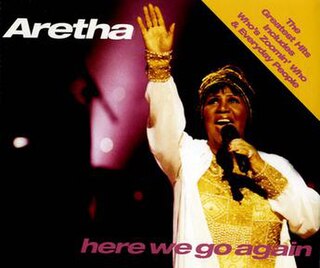
"Here We Go Again" is a song by American singer and songwriter Aretha Franklin. It was written by Trina Broussard, Jermaine Dupri and Trey Lorenz for Franklin's thirty-fourth studio album, A Rose Is Still a Rose (1998), while production was helmed by Dupri and Manuel Seal. The song is built around replayed portions of "The Glow of Love" (1980) by Italian-American post-disco group Change. Due to the inclusion of the sample, Mauro Malavasi, David Romani and Wayne K. Garfield are also credited as songwriters. The song was the second single released from A Rose Is Still a Rose in June 1998 and reached number 76 on the Billboard Hot 100, also becoming Franklin's fifth number one on the US Dance Club Songs.
"And On and On" is a song by American singer Janet Jackson from her second remix album Janet Remixed (1995). As the B-side to "Any Time, Any Place", "And On and On" peaked at number one on the US Billboard Hot R&B/Hip-Hop Songs chart and number two on the Billboard Hot 100. It also reached number one as a B-side on the Cash Box chart in the summer of 1994.



















